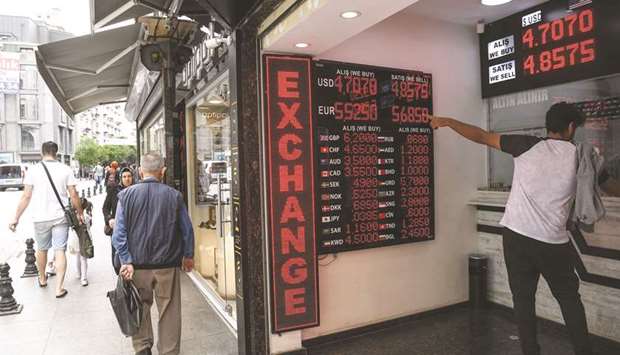Turkey’s lira weakened more than 3% yesterday, giving up a large chunk of the gains it made after the central bank raised interest rates by 300 points a day earlier, as investors bet another hike would be needed to tame the sell-off.
The central bank raised its top interest rate to 16.5% at an extraordinary meeting on Wednesday in a bid to break a relentless, weeks-long fall in the currency.
The lira had depreciated as much as 23% so far this year before the bank’s move.
The central bank yesterday also increased the maximum total of forward foreign exchange (NDF) sale positions from $6.15bn to $8bn for the second quarter.
Such a move, providing more dollar liquidity to the market, could theoretically support the lira in the medium-term, but appeared to have little immediate effect.
The currency’s dramatic decline reflects investor concerns about the central bank’s ability to tame double-digit inflation, particularly after President Recep Tayyip Erdogan, a self-described “enemy of interest rates,” said he expected to assert more monetary policy control after June 24 elections.
“It might prove insufficient to stabilise the currency, as concerns about monetary policy-making in the post-election period will remain...given the president’s vow to tighten his grip on economy policy,” said Gokce Celik, chief economist at QNB Finansbank, in a note to clients.
The lira was at 4.7891 against the dollar at 1509 GMT, versus its close of 4.5900. It hit a record low of 4.9290 on Wednesday before the rate hike. It is now down some 19% year-to-date.
The yield on Turkish 10-year government bonds fell to its lowest since May 15. Dollar bonds rose, and the cost of insuring Turkish debt against default fell to a one-week low.
Some analysts pointed out that the bank, in Wednesday’s statement, dropped its usual wording that “further monetary policy tightening will be delivered, if needed”. That sowed some concern that it may not increase rates at its next scheduled policy meeting, on June 7.
“We will need to see some further tightening in the regular scheduled (monetary policy committee) meeting on June 7 as well,” said Inan Demir, of Nomura International. “So that they can increase the real rate and go beyond catching up with inflation and actually move ahead of the curve.”
Following the bank’s move, Erdogan said “financial discipline will continue and the necessary things will be done for financial stability”.
But he also said the currency’s volatility did not reflect economic reality and, echoing his frequent references to foreign threats, warned that he would not let “global governance types” ruin the country.
Erdogan wants to see lower borrowing rates to fuel credit growth and new construction.
Investors, who fear the economy has overheated after a more than 7% expansion last year, want decisive rate hikes to cool inflation.
The president also said in his speech on Wednesday he would look to take action on inflation after the June 24 vote, although he did not say concretely what that might be.
“We will definitely take measures to lower the inflation and current account deficit in a very different way after the elections,” Erdogan said.
He also said Turkey would stop the current account deficit being a structural problem and would lower it permanently.

A board screen displays dollar and euro exchange rates in Turkish lira as man changes money on Wednesday in Istanbul. The lira is now down some 19% year-to-date.
